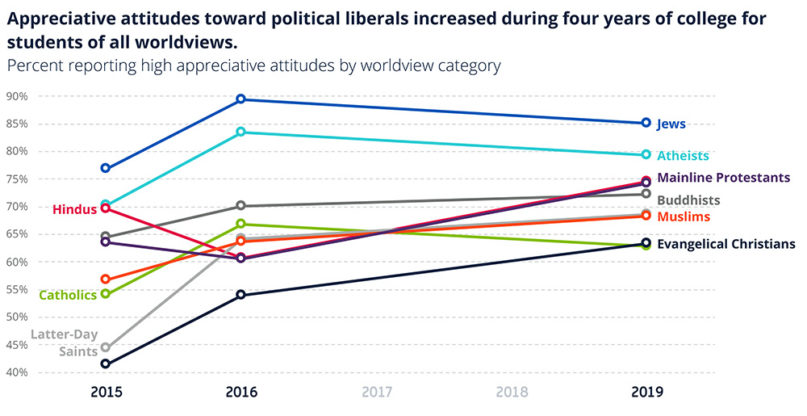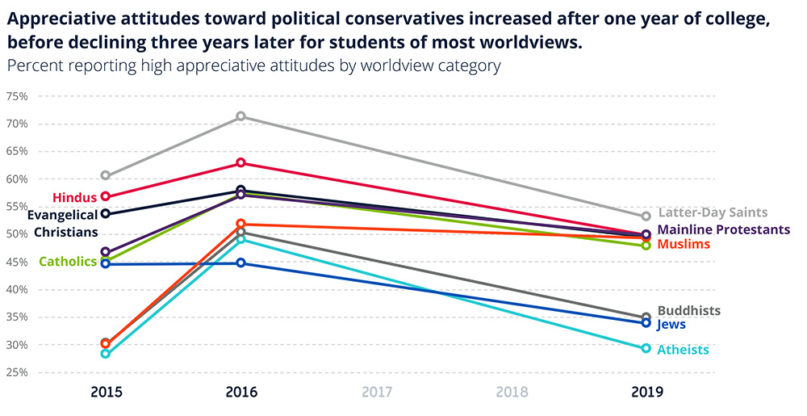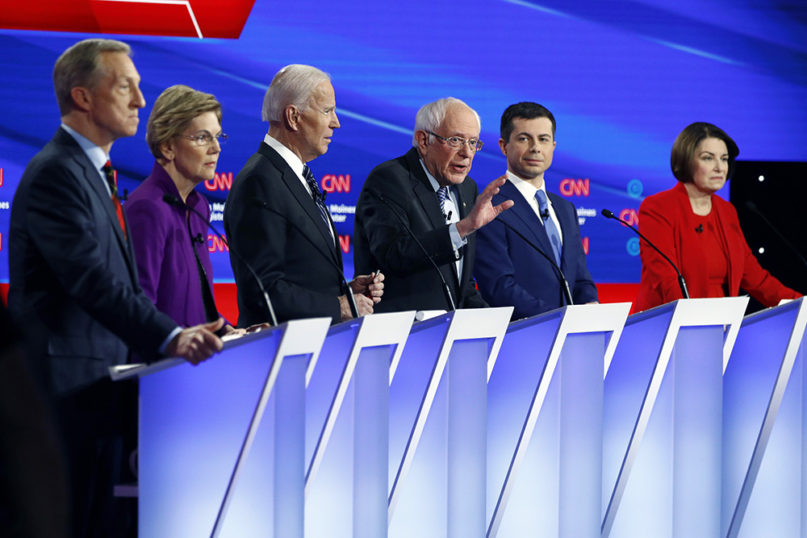(RNS) — In January, Democratic presidential candidate Elizabeth Warren launched an interfaith advisory council as part of a “righteous struggle” to defeat Donald Trump in 2020. The council began with 16 leaders, but 100 more are expected to be added in the near future.
This is part of an unprecedented push among Democratic presidential candidates to court voters of faith ahead of the 2020 election. Joe Biden, Bernie Sanders and Pete Buttigieg have also appointed faith-based advisers to their campaigns. Progressive faith activist Guthrie Graves-Fitzsimmons called the 2020 election a kairos moment for the religious left.
Paul Raushenbush of Interfaith Youth Core notes that with Trump being so closely identified with white, right-wing Christians, Democrats “see the possibilities of attracting many voters whose faith promotes a more generous, pluralistic, welcoming and equitable America.”
Others push candidates to court Evangelical voters who may be tired of Trump’s policies and personal behavior, which some find increasingly antithetical to their faith.
In the grander scheme of things, some on the Left are hoping to undermine the narrative that religiosity is commensurate with the Republican Party. “We live in a society that in our public imagination equates ‘religious’ with ‘conservative’ and contrasts the ‘religious right’ with the ‘secular left,’” Guthrie Graves-Fitzsimmons told Religion & Politics, while Cory Booker told Religion News that Democrats “make the mistake often of ceding (religious) territory to Republicans of faith.”
While these progressive faith efforts are burgeoning, they will not reach their full potential without a special focus on voters attending America’s colleges.
Our national study across more than 100 colleges and universities (IDEALS) found that students across all major faiths grew more highly appreciative of political liberals during college, and the highest degrees of growth were among evangelical students (22% growth) and LDS students (24% growth).

“Appreciative attitudes toward political liberals increased during four years of college for students of all worldviews.” Graphic courtesy of IDEALS
On the other side of the aisle, while student appreciation for political conservatives actually rose in the final year of President Obama’s second term (with Jews being the exception), this growth was eradicated by the end of their senior year, which marked the beginning of Trump’s third year in office. Among evangelical and LDS students, their appreciation for political conservatives actually dropped beneath their appreciation levels entering college. Overall, the greatest decline in appreciation for political conservatives over four years in college occurred among Jewish students (-11%).
IDEALS measures appreciative attitudes by asking to what level students agree with the following statements with regard to a particular worldview group:
- In general, people in this group make positive contributions to society.
- In general, individuals in this group are ethical people.
- I have things in common with people in this group.
- In general, I have a positive attitude toward people in this group.
Students that agree “somewhat” or “strongly” with these statements, taken together, are considered to be highly appreciative of a certain worldview group.

“Appreciative attitudes toward political conservatives increased after one year of college, before declining three years later for students of most worldviews.” Graphic courtesy of IDEALS
These findings suggest college campuses should be a primary target for progressive faith activists ahead of the 2020 election.
There is a strong current moving students to see Democrats as positive contributors to society, and members of every major faith group are being swept up by it. This includes evangelical and LDS students one would typically associate with conservative politics. These students have now experienced three years of declining appreciation for political conservatives. All of this suggests that those evangelical and LDS students who voted for Trump in 2016 are flippable to vote Democrat in 2020.
To do this, however, Democratic candidates will need to make the investment on campus. They will need to make persuasive appeals to evangelicals and Latter Day Saints that their policies are a more faithful expression of Christlikeness than either Trump or his administration’s policies.
Fortunately, they won’t need to start from scratch; our findings suggest they just need to close the deal. In his new book “Rock of Ages: Subcultural Religious Identity and Public Opinion among Young Evangelicals,” Jeremiah Castle discovered young evangelicals are open to immigrants, LGBT rights, caring for the environment and government aid to the poor — issues that Democrats also care very much about.
Some might contend that student votes won’t make a meaningful difference in the outcome of the 2020 election. However, Trump only carried the state of Michigan, for example, by 11,000 votes in 2016. Calvin College, a staple evangelical institution, has 3,700 students alone.
The ground is tilled for progressive faith activists to make an impact on college campuses going into 2020. Will they bother to plant the seeds?
(Matthew J. Mayhew is a professor of educational administration at the Ohio State University. Laura Dahl is an assistant professor of higher education at North Dakota State University. Alyssa N. Rockenbach is a professor of higher education at North Carolina State University, where Kevin Singer is a doctoral student in higher education. The views expressed in this commentary do not necessarily reflect those of Religion News Service.)





